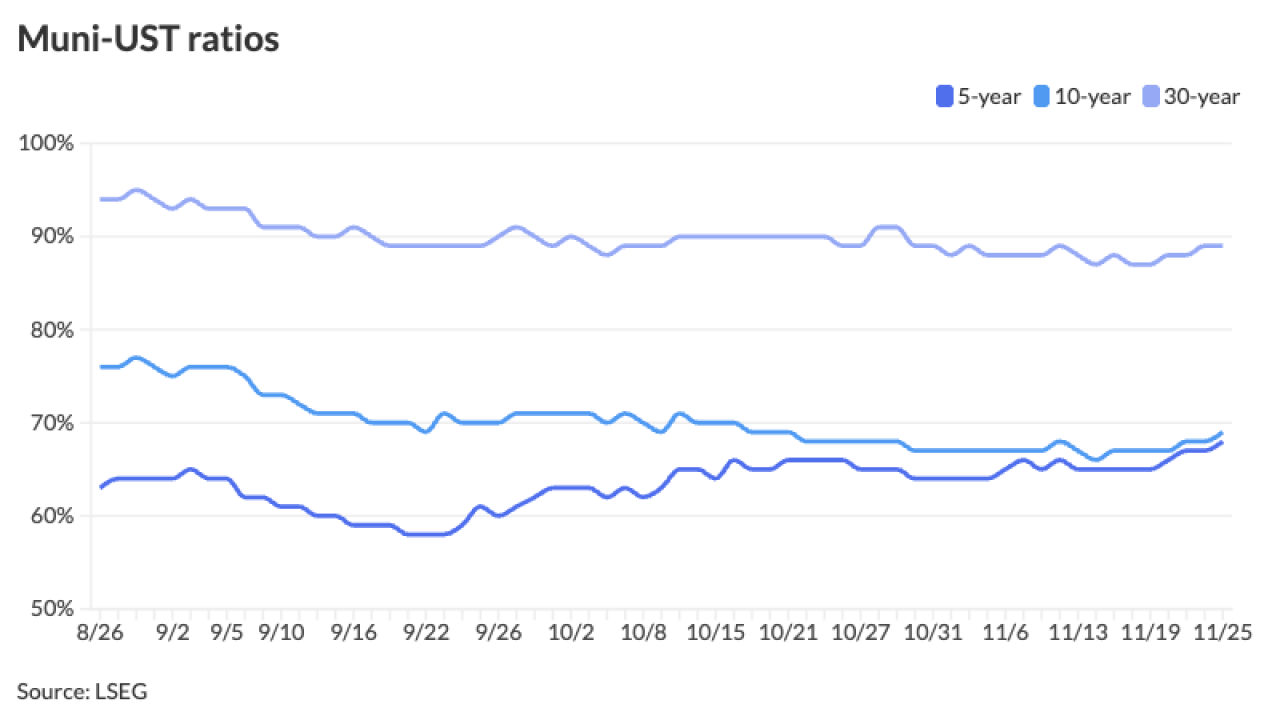As Bill de Blasio prepares to become New York City’s first Democratic mayor in 20 years, observers say the capital markets are taking a wait-and-see approach toward a city rife with financial uncertainty.
“Will the bond market price in some of that uncertainty or will it recognize that New York City has very strong management on multiple levels and that it’s more business as usual? That’s an interesting question,” Morningstar Inc. municipal analyst Rachel Barkley said Wednesday.
De Blasio, the city’s public advocate for four years and a former city councilman from Brooklyn, trounced Republican Joseph Lhota in a nearly 50-point landslide in Tuesday night’s open-seat election. He won 73% of the vote overwhelming Lhota, a former deputy mayor and former chairman of the Metropolitan Transportation Authority.
Twelve-year Mayor Michael Bloomberg will leave office on Jan. 1, with term limits preventing Bloomberg from running again.
De Blasio’s liberal agenda includes a call for a tax on wealthy individuals to pay for universal pre-kindergarten and after-school programs, and an end to stop-and-frisk police practices. “We aren’t threatening anyone’s success. We are asking those who have done very well to insure that every child has the same opportunity to do just as well as they have,” he said in his victory speech.
Dick Larkin, senior vice president and director of credit analysis for HJ Sims & Co., sees no effect on the markets.
“Frankly, I don’t think it will have much of an immediate impact on New York City bond prices,” he said. “Some people think it will because the spigot for spending will be opened, but I don’t buy it. There are too many financial controls in place.”
The city’s myriad fiscal challenges include labor contract negotiations that could include retroactive pay for 300,000 municipal workers and escalating employee health insurance costs.
All union contracts in the city have expired, some since 2008, and Bloomberg froze salaries for the past three years. According to the Citizens Budget Commission watchdog agency, lack of an employee contribution for most health plans -- the city fully covers the cost for nine of every 10 employees -- has forced annual heath-care costs to double to $5.3 billion over 10 years.
In addition, the economy is sensitive to interest rates given its heavy reliance on the financial services and real estate industries, according to Wells Fargo Securities head of municipal research Natalie Cohen.
“These factors, plus potentially heavy labor costs, [depending on how the new mayor handles contracts and healthcare obligations], could challenge the next mayor to keep the city’s fiscal profile healthy,” Cohen wrote in a report.
“The new mayor will definitely have his hands full,” Barkley said. “Obviously it’s one of the most complicated cities to run. Its vast array of city services is unparalleled.”
De Blasio is the first Democrat in Gracie Mansion since David Dinkins left office in 1993. On Wednesday he named Jennifer Jones Austin and Carl Weisbrod, two public-sector veterans, as co-chairs of his transition team.
“What you’ll see is that [de Blasio] will put people he trusts in important positions. You’ll see some familiar names from the past, from the Dinkins years and even the Koch years, and some Clintonites, as I like to call them,” said Anthony Figliola, the vice president of Empire Government Strategies in Uniondale, N.Y.
De Blasio may have to temper his hard-line liberal positions once in office, Figliola said.
“This could go one of two ways. He could do all he promised at the expense of everything that has been built high property values, crime down, a big tech initiative or he could take a more pragmatic approach,” said Figliola, a former deputy supervisor of Brookhaven, N.Y. “I think he’ll be the pragmatist. At the end of the day, he’ll look at the numbers. If he’s just a firebrand, he’ll probably be a one-term mayor.”
As expected, Democrat Scott Stringer rolled past Republican John Burnett with 81% of the vote in the race for city comptroller, an office of 750 employees that oversees the city’s bond issuance, five municipal employee pension funds valued at $140 billion, and audits municipal agencies. Stringer, the Manhattan borough president since 2006 and a former state assemblyman, succeeds John Liu, who ran unsuccessfully for mayor. Burnett, a 23-year Wall Street veteran, was making his first run for public office.
Stringer said he would look to consolidate the pension funds through negotiation, and wants to launch a bureau to audit roughly $15 billion in Hurricane Sandy reimbursement funds.
“I recognize that I have to watch out and maintain the fiscal outlook of the city,” Stringer told supporters.
Moody’s Investors Service rates the city’s general obligation bonds Aa2, while Fitch Ratings and Standard & Poor’s rate them AA.
Brooklyn Democratic councilwoman Letitia James will replace de Blasio as public advocate, an office that has served as a political stepping-stone. James is the first black female elected to citywide office.





